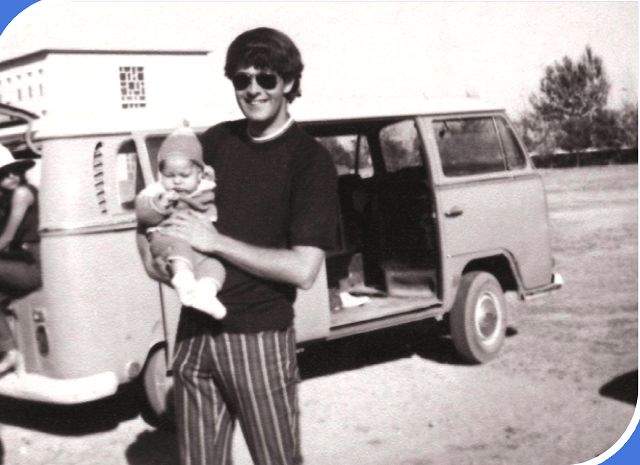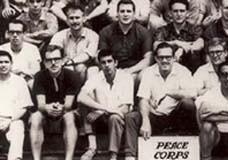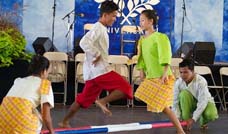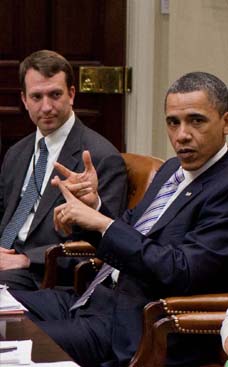
I lived in Afghanistan for most of the years between 1965 and 1974. My wife and I spent the first two of those years as Peace Corps volunteers. We returned to live there while I was a Fulbright scholar and then executive director of the Fulbright Foundation in Afghanistan. Our eldest child was born there during the last of these experiences. Images I retain from an earlier time suggest reasons for hope for this beleaguered country, whose people have endured unrelieved war, deprivation, and instability for nearly 40 years. Not all images today are negative. There are exponentially more children in school, both as a total number and percentage, than at any time in Afghan history. Women again are teaching and working in government offices, dressing modestly, but without the chaadiri required by the Taliban. There are 50 independent, private television stations and hundreds of private radio stations, newspapers and magazines. Roads are being built in remote areas. Agricultural development projects are being renewed. There are institutions of higher education in all major population centers; while not fully evolved, they are, nonetheless, a base for future educational development. Though Afghan government officials, including President Hamid Karzai, are regularly portrayed as ineffective or corrupt, the new constitution and governmental infrastructure, both modeled upon that which Zahir Shah ushered in 50 years ago, are functioning. Lost in the news of ballot stuffing in recent elections is the fact that 43 Afghans, men and women, felt committed enough to the constitution and to participating in their own governance to stand for election as president. Twenty-nine percent of the members of the Afghan lower house of Parliament, as guaranteed by the Afghan constitution, are women; 18 percent of the members of the U.S. House of Representatives are female. Afghans are demonstrating their confidence in the future by investing their own money in the rebuilding of their homes and shops, in constructing new buildings, in sending their children to school.
RPCV Thomas Gouttierre writes: My wife and I spent two years in Afghanistan as Peace Corps volunteers
Images of Afghanistan
By Thomas Gouttierre
Director, UNO Center for Afghanistan Studies
Caption: Thomas Gouttierre, then director of the Fulbright Foundation in Afghanistan, holds his infant son, Adam, in Kabul in the summer of 1971. The building behind them was then the headquarters of Afghanistan's national radio and television.
Images today of Afghanistan are rarely positive. There is little reporting on that nation's rich culture and history, the renowned hospitality of the Afghan people, or its stunning physical beauty.
Instead, reports of suicide bombings, loss of civilian and military lives, gender inequality, religious extremism, poppy cultivation and allegations of corruption and election fraud dominate the news and suggest a troubled future.
Images I retain from an earlier time suggest reasons for hope for this beleaguered country, whose people have endured unrelieved war, deprivation, and instability for nearly 40 years.
I lived in Afghanistan for most of the years between 1965 and 1974. My wife and I spent the first two of those years as Peace Corps volunteers. We returned to live there while I was a Fulbright scholar and then executive director of the Fulbright Foundation in Afghanistan. Our eldest child was born there during the last of these experiences.
Afghans often refer to the period between 1963 and 1973 as their country's Golden Age. At the beginning of that decade, Afghanistan's monarch, Zahir Shah, worked with Afghan intellectuals and technocrats, many of whom had received graduate degrees from American institutions of higher education, to present a progressive constitution to his fellow citizens.
This document, approved by a national assembly, initiated the process of transforming Afghanistan's government to a democratic, constitutional, parliamentary monarchy.
The ensuing transformation, though often inconsistent and troubled, was embraced by Afghans. They contrasted their country to their neighbors - Pakistan under military rule, Iran under the repressive police state of the Shahinshah, and the totalitarian regimes of Communist Soviet Union and China.
The Afghans welcomed modernization and opportunity.
No fields of opium poppies were under cultivation anywhere. Food was plentiful in the bazaars. Afghans and foreigners could travel between cities and provinces for work, recreation or vacation without restriction or security concerns.
In population centers, growing numbers of elementary and secondary school students were female. The colleges of education and humanities at Kabul University had more young women than men in their classrooms, with increasing numbers joining the colleges of medicine and engineering.
More than 50 percent of the teachers and government employees in Kabul were educated women; few urban women wore the enveloping full-body chaadiri, preferring scarves or no head covering at all.
In Kabul, Afghan women, young and old, could move about to shop, to visit, go to work and school without obligatory male escorts; mothers and their children played together in the city's parks without concern for safety.
To be sure, such progress was mostly in population centers; rural Afghanistan, as in all developing societies, would lag behind. Yet, even in agrarian and tribal-based provinces and districts, the Afghan central government had offices and staff to provide security, public works, and social and judicial services, as well as education for young girls and boys.
Afghanistan counted itself as one of the neutral, non-aligned nations. The East and West competed to provide assistance to Afghanistan as part of the Cold War. Foreign service professionals from both blocs often sat in meetings together to plan development strategies.
It was an exciting chapter in Afghanistan's history, an ideal time and place to serve as an American Peace Corps volunteer or foreign service officer.
The United States was a partner with the Afghan government in the development process in Afghanistan. Zahir Shah and his wife were hosted in the White House by President John F. Kennedy. Afghans took great pride and pleasure in inviting Americans into their homes, to their weddings and family parties, providing the hospitality for which they were so well-known.
Projects funded by the U.S. Agency for International Development provided training and employment for tens of thousands of Afghans in the construction of roads and bridges, irrigation and power dams and grids, an airport in the second largest city, Kandahar.
U.S. AID agricultural development projects succeeded in making Afghanistan nearly self-sufficient in grain production and animal husbandry, and an exporter of pomegranates, grapes, raisins, apples, pistachios, almonds and walnuts.
Peace Corps volunteers served as teachers, vaccinators, auditors and rural development workers throughout urban and rural Afghanistan. Female volunteers could ride alone on their bikes into the bazaars or to work with little concern for their security. Every school wanted Peace Corps English teachers.
It was indeed a different time with different images.
It was not idyllic; Afghanistan was then as now a poor, developing country. But it had not undergone decades of war and devastation. Afghans had a sense of moving forward, of hope, of being able to participate in setting their own future.
History does not necessarily foretell a better future. But Afghans remember when they effectively managed themselves and their government. They believe that it is their legacy and that they can do it again.
They understand, after decades of turmoil and instability, they cannot do it without the assistance of international partners, particularly Americans.
Not all images today are negative. There are exponentially more children in school, both as a total number and percentage, than at any time in Afghan history. Women again are teaching and working in government offices, dressing modestly, but without the chaadiri required by the Taliban.
There are 50 independent, private television stations and hundreds of private radio stations, newspapers and magazines. Roads are being built in remote areas. Agricultural development projects are being renewed.
There are institutions of higher education in all major population centers; while not fully evolved, they are, nonetheless, a base for future educational development.
Though Afghan government officials, including President Hamid Karzai, are regularly portrayed as ineffective or corrupt, the new constitution and governmental infrastructure, both modeled upon that which Zahir Shah ushered in 50 years ago, are functioning.
Lost in the news of ballot stuffing in recent elections is the fact that 43 Afghans, men and women, felt committed enough to the constitution and to participating in their own governance to stand for election as president.
Twenty-nine percent of the members of the Afghan lower house of Parliament, as guaranteed by the Afghan constitution, are women; 18 percent of the members of the U.S. House of Representatives are female.
Afghans are demonstrating their confidence in the future by investing their own money in the rebuilding of their homes and shops, in constructing new buildings, in sending their children to school.
The change in military strategy under Secretary of Defense Robert Gates; Adm. Mike Mullen, chairman of the Joint Chiefs of Staff; and Gen. David Petraeus, commander of U.S. Forces Afghanistan, is improving security in population centers. Violence by insurgents is taking place primarily in only a couple of dozen of Afghanistan's nearly 400 districts.
The troop strength and capacity of the Afghan National Army, trained by American and other foreign military, has increased demonstrably. The military capacity of the Taliban forces in Afghanistan is being degraded, causing them to target Afghan civilians to avoid confronting the enhanced combined international and Afghan armed forces.
This, in turn, reduces their already-low ranking among Afghans.
Images coming out of Afghanistan in the near future will likely be a mixed bag. Nation reconstruction, especially following years of war and destruction, is even more challenging than nation building.
Complicating Afghanistan's case, its neighbor, Pakistan, the putative U.S. ally in combating terrorists, continues to harbor, train, support and arm Taliban who cross over into Afghanistan to attack Afghans and Americans. Nonetheless, Afghans, who four times defeated the British and Soviet armies in wars in the 19th and 20th centuries, and who recall better times decades ago, are eager to work for a better future.
In the final analysis, Americans and their international allies must remember that the conflict in Afghanistan is not a war against Afghans. No Afghans participated in the 9/11 attacks.
The campaign in Afghanistan is part of greater, global conflict: the War Against Militant Islamist Terrorism, which like the protracted Cold War, requires sustained determination.
















